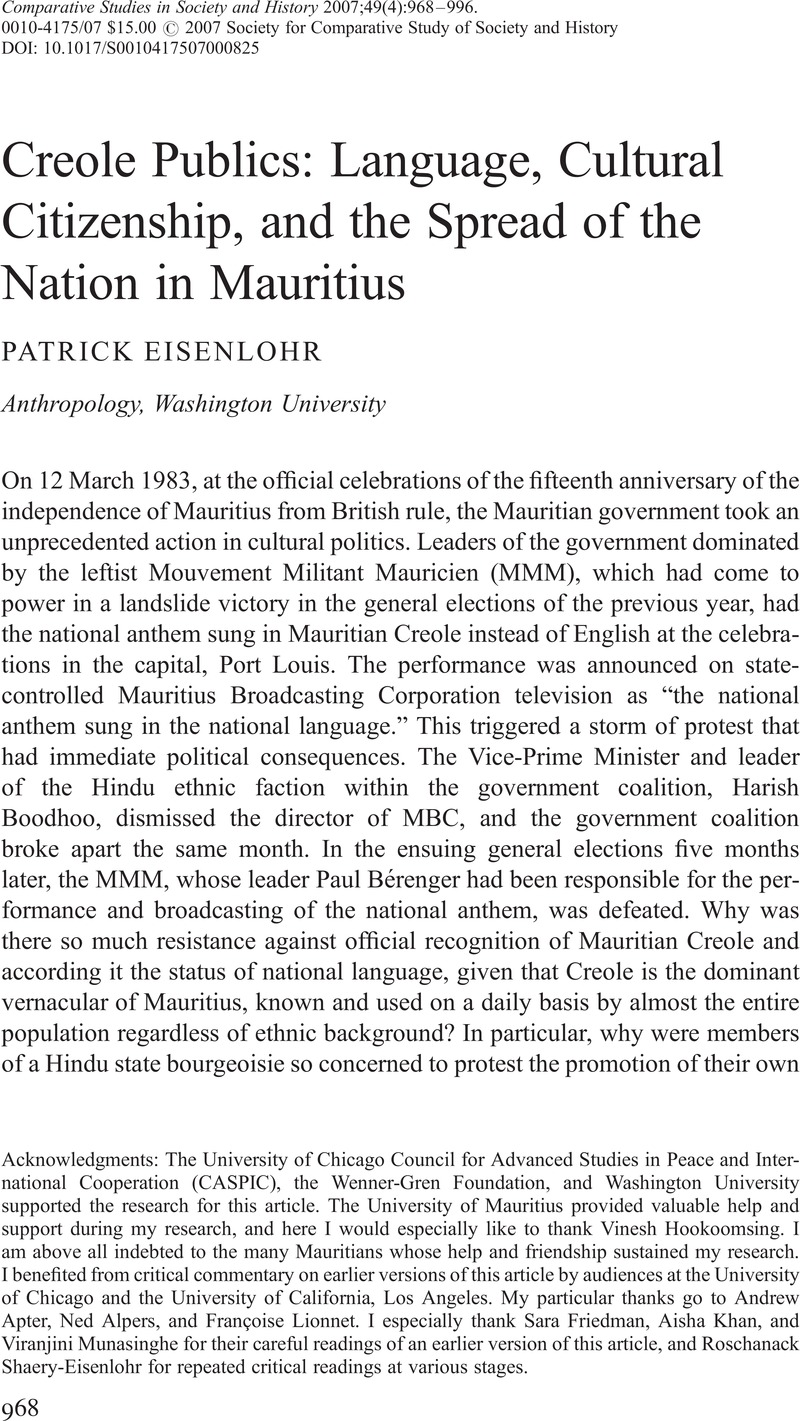Crossref Citations
This article has been cited by the following publications. This list is generated based on data provided by Crossref.
Shaery-Eisenlohr, Roschanack
2009.
Territorializing Piety: Genealogy, Transnationalism, and Shi‘ite Politics in Modern Lebanon.
Comparative Studies in Society and History,
Vol. 51,
Issue. 3,
p.
533.
Jungers, Christin M.
Gregoire, Jocelyn
and
Slagel, Leslie
2009.
Racial/Ethnic Identity among Creole Peoples in Mauritius.
Journal of Psychology in Africa,
Vol. 19,
Issue. 3,
p.
301.
Ng Tseung-Wong, Caroline
and
Verkuyten, Maykel
2010.
Intergroup evaluations, group indispensability and prototypicality judgments: A study in Mauritius.
Group Processes & Intergroup Relations,
Vol. 13,
Issue. 5,
p.
621.
Carsignol, Anouck
2011.
L’Inde et sa diaspora.
p.
261.
Boutaghou, Maya
2011.
Dfense et illustration d'un universel mauricien.
International Journal of Francophone Studies,
Vol. 13,
Issue. 3,
p.
451.
Eisenlohr, Patrick
2011.
Religious Media, Devotional Islam, and the Morality of Ethnic Pluralism in Mauritius.
World Development,
Vol. 39,
Issue. 2,
p.
261.
Owodally, Ambarin Mooznah Auleear
2011.
Multilingual Language and Literacy Practices and Social Identities in Sunni Madrassahs in Mauritius: A Case Study.
Reading Research Quarterly,
Vol. 46,
Issue. 2,
p.
134.
Auleear Owodally, Ambarin Mooznah
and
Unjore, Sanju
2013.
Kreol at school: a case study of Mauritian Muslims' language and literacy ideologies.
Journal of Multilingual and Multicultural Development,
Vol. 34,
Issue. 3,
p.
213.
Reynolds, Jennifer F.
and
Chun, Elaine W.
2013.
Figuring youth citizenship: Communicative practices mediating the cultural politics of citizenship and age.
Language & Communication,
Vol. 33,
Issue. 4,
p.
473.
Auleear Owodally, Ambarin Mooznah
2014.
Language, education and identities in plural Mauritius: a study of the Kreol, Hindi and Urdu Standard 1 textbooks.
Language and Education,
Vol. 28,
Issue. 4,
p.
319.
Hirschmann, David
2015.
‘Rendering’ Ethnicity in the Mauritius National Assembly: Continuities and Codes.
Parliamentary Affairs,
Vol. 68,
Issue. 4,
p.
647.
2016.
Île rêvée, île réelle.
p.
311.
Eisenlohr, Patrick
2016.
Religion and Diaspora: Islam as Ancestral Heritage in Mauritius.
Journal of Muslims in Europe,
Vol. 5,
Issue. 1,
p.
87.
Paz, Alejandro I.
2019.
Communicating Citizenship.
Annual Review of Anthropology,
Vol. 48,
Issue. 1,
p.
77.
Boswell, Rosabelle
2020.
Is COVID-19 Transforming Speech in Mauritius?.
Journal of African Diaspora Archaeology and Heritage,
Vol. 9,
Issue. 3,
p.
255.
Chintaram, Marie Vinnarasi
2021.
Mauritians and Latter-Day Saints: Multicultural Oral Histories of The Church of Jesus Christ of Latter-Day Saints within “The Rainbow Nation”.
Religions,
Vol. 12,
Issue. 8,
p.
651.
Bissoonauth, Anu
2021.
Language and attitude shift of young Mauritians in secondary education.
Journal of Multilingual and Multicultural Development,
Vol. 42,
Issue. 1,
p.
64.
Krämer, Philipp
Mijts, Eric
and
Bartens, Angela
2022.
Language Making of Creoles in multilingual postcolonial societies.
International Journal of the Sociology of Language,
Vol. 2022,
Issue. 274,
p.
51.
Guo, Taihui
and
You, Tianlong
2023.
Creating the governable population: authoritarian cultural citizenship and the ethnic minorities in a Sino-Tibetan intercultural area in contemporary China.
Citizenship Studies,
Vol. 27,
Issue. 6,
p.
654.
Schram, Ryan
2023.
“Sanguma Em I Stap” (Sanguma Is Real).
Current Anthropology,
Vol. 64,
Issue. 1,
p.
49.





